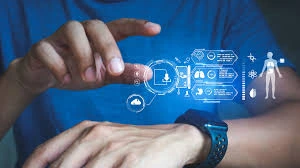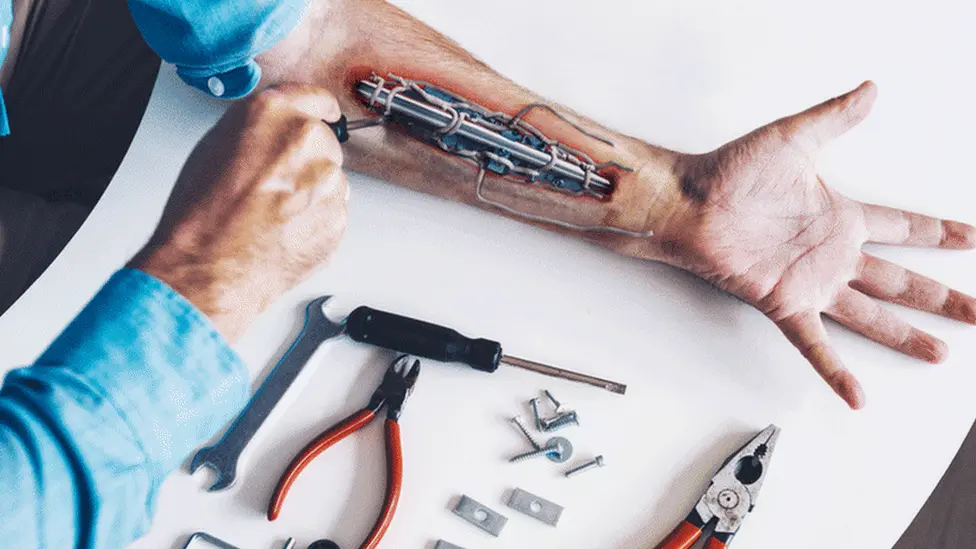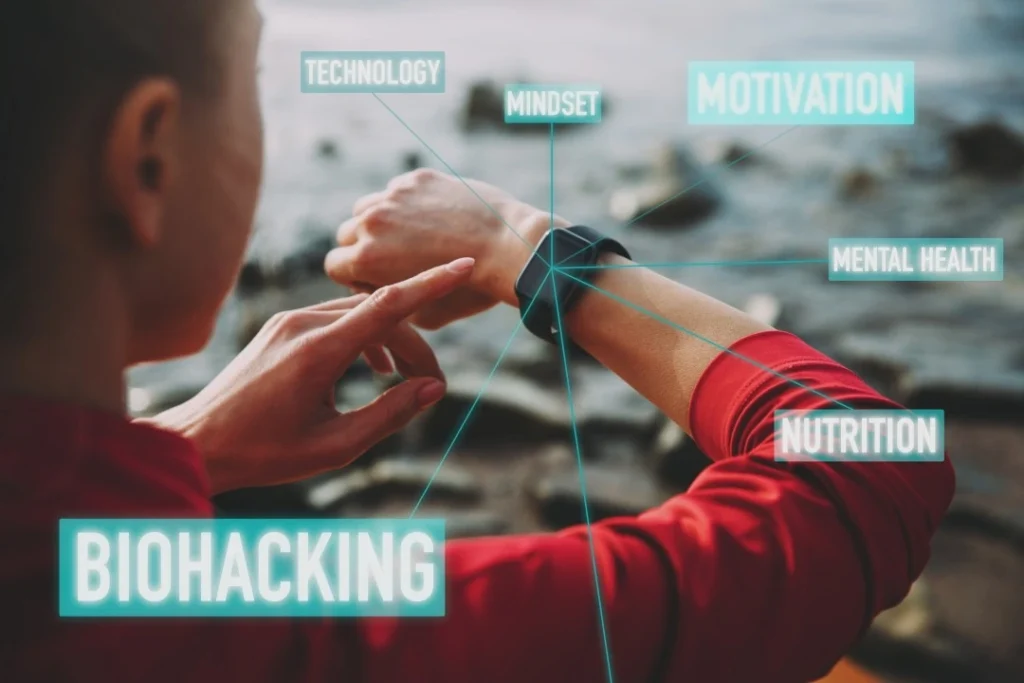In today’s world, technology is used in almost every part of our lives. From smartphones to smart homes, there is nothing without technology. But do you know now technology is also inculcated in health and abilities. Yes, you heard it right. This is called Biohacking. Biohacking is when people use science and technology to change their minds and bodies to feel strong and better. Some of it is easy and simple, like better eating and sleep tracking. But some of them are advanced, like changing your DNA. In this blog, we’ll be talking about biohacking tools and the technologies used in it.
Biohacking Tools and Techniques

1. Wearable Technologies
- What It Is: Wearables like gadgets like smartwatches, fitness rings and trackers that you wear on your body.
- How It Helps: These devices are used to track things like heart rate, and sleep cycle. step counts and even the stress you take in a day.
- Popular Examples: Smartwatches like the Apple Watch or fitness trackers are popular devices used by biohackers to improve their health. For example: Your watch can track your sleep cycle and tell that you aren’t getting enough sleep.
2. Nootropics
- What They Are: Nootropics are special supplements that can help your brain work better. People take them to improve memory, focus and mood.
- Common Nootropics: Some people drink coffee to stay awake. Coffee contains caffeine which can help your brain stay awake. Others take L-Theanine, which helps calm the mind while still focusing.
- How It Helps: Nootropics helps to improve concentration and improve memory. These are often used by students, professionals, and anyone who wants to think faster. It helps to improve concentration and improve memory.
3. Genetic Testing and Modifications
- What It Is: Genetic testing looks at your DNA. It is used to find out things like your health risks, family history, and even your physical traits like eye colour. Some biohackers use genetic tests to see what could happen in the future. It can prevent problems before they happen.
- How It Helps: There are tests to look for Genetic problems. Companies like 23andMe and AncestryDNA offer these tests. These tests can help you better know about your health. You can choose the best exercise and food according to your health, through these tests.
- Genetic Modification: Some biohackers are even working on changing their DNA. It can help prevent diseases or make them stronger. Rember it is very new and not fully safe yet.
- Why It’s Interesting: In the future, this technology could help people live healthier lives by stopping diseases. Earlier, the idea of changing your DNA might sound like science fiction, but it’s a real possibility in today’s world.
4. Implantable Devices
- What They Are: Implanted devices are a type of devices that are put under your skin. They help to unlock door, track health and send signals to brain.
- How They Help: Some biohackers use microchips that allow them to open doors without a key. Other biohackers have implants that send electrical signals to their brain to help with things like chronic pain or depression. They can even make payments using just their hand.
- Cool Example: A biohacker might implant a small magnet in their finger. This helps them sense magnetic fields, which can help them feel the world around them in a new way.
5. Cryotherapy and Cold Exposure
- What It Is: Cryotherapy involves using cold to help your body recover faster. This can be done by taking cold showers or jumping into ice baths. It can make your body really cold for a short time.
- How It Helps: Cryotherapy helps reduce swelling. It also improves recovery after workouts, and even burns fat. It can make you feel better after hard physical activity. Thus helping you feel less sore and more energetic.
- Popular Example: After a hard workout, some biohackers take ice baths to help their muscles heal quickly. This helps them feel less tired.
6. Meditation and Mindfulness
- What It Is: Meditation is a way to calm body and soul. Meditation offers several benefits like improved focus. It also reduces stress. Biohackers use meditation to keep healthy and sharp brains.
- How It Helps: Meditation helps reduce anxiety. Some biohackers even use special devices, like the Muse headband, to track their brain waves while they meditate and improve their focus. Thus helping them feel more relaxed.
- Why It’s Important: Managing stress helps them sleep better, and keep their brains in good shape. Many people practice meditation to manage stress. Managing stress helps them sleep better, and keep their brains in good shape. It’s a simple and natural way to improve focus.
How Biohacking Can Benefit You

Biohacking can help improve different parts of your life, like your health, mind, and overall body. Here are some of the benefits of biohacking:
1. Improved Physical Health
- Biohacking can help improve your choice. It can help you make more healthy and active choices.
- Fitness trackers encourage you to stay active, and nootropic supplements can help you make better decisions about how to eat and exercise.
2. Better Mental Clarity and Focus
- To sharpen their minds many biohackers use supplements, meditation, and other methods. Using nootropics or practising mindfulness can help you concentrate. It can help you remember things better, and stay calm in stressful situations.
3. Living Longer
- Biohacking isn’t just about feeling better today. It’s also about staying healthy as you age. With genetic testing and healthy lifestyle changes, you might be able to reduce your risk of getting sick in the future and live longer.
4. Better Sleep
- Sleep is important for staying healthy, feeling good, and having energy during the day. You can use wearable devices to track your sleep. Learning about your sleeping patterns can help you find problems and solutions to unhealthy patterns.
5. Increased Productivity
- Biohacking can help you become more productive. As it improves your energy levels, focus, and sleep. When you feel better, you can get more work done in less time.
Ethical and Health Considerations
Biohacking has transforming benefits. But there are so many risks involved in Biohacking. Consider all the side-effects before going for any Biohacking technique. Here are some main points to keep in mind:
- Consult with Doctor: Before trying any of these technique consult with your doctor. It will help you avoid any harmful side effects or problems.
- Be Careful with Gene Editing: Advance technological things like changing DNA or using implants can be risky. It’s important to consult to professional and take steps wisely before doing any biohacking technology.
- Think About Ethics: Some bio-hacking techniques like gene modification can bring ethical questions.
Conclusion
Biohacking is the use of technology and science. It can improve your life for the better. Biohacking has many options which can help you optimize your health, mind and body. Biohacking can do simple things like just tracking steps to advanced things like changing eye colour. However, the main aspect is to approach biohacking safely and wisely. Remember to use it safely. Consult with a professional and think about your choices wisely. Do not dive into any biohacking technique without guidance.

